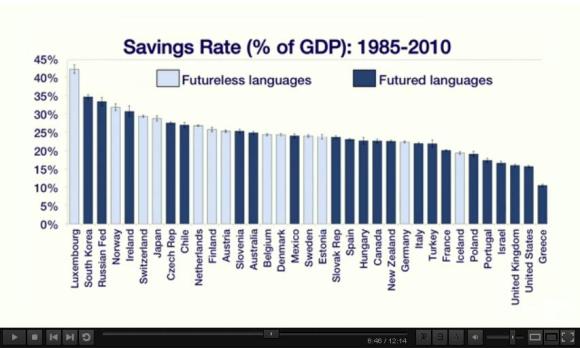
Do you find yourself living in the now, enjoying the time and money you have presently without worrying so much about putting away for the future? According to one economist, the language you speak may play a role in how well you’re able to save money. Speakers of Norwegian or Japanese, for example, are more likely to save more money per year, and have more money saved up by the time they retire, than are speakers of, say, English or Greek.
But what is it exactly that differs between these languages, and most importantly, what relation does that have to money?
As it turns out, our language has an effect on the way we see the world. To give a simple example, in English, we can refer to a specific sibling as either “my brother” or “my sister” without consideration for their age in relation to ourselves. But in Japanese, there is no singular word for “brother” or “sister”, so speakers must convey whether the sibling they are referring to is an older brother or sister (ani or ane, respectively) or a younger brother or sister (otouto or imouto), even in the case of twins. Then there are the words used for other people’s siblings, but that’s another story…
While English speakers might not see the necessity of always indicating whether a sibling is older or younger, in a society like Japan that places more emphasis on age and hierarchy, it’s only natural to make that distinction.
▼I may be only four minutes older, but I’m still your elder!

In this same way, economist Keith Chen believes that whether or not a language differentiates between present and future tense has an effect on how we view time and, in turn, how likely we are to put money aside for the future.
In English, we have different verbs to help us distinguish between past, present, and future. Using Chen’s example, we would say, “It rained yesterday”, “It’s raining today”, or “It will rain tomorrow”, to indicate when exactly the rain has happened, or will happen. But in futureless languages such as German or Japanese, there is no future tense. To say in Japanese, “Ame ga furu” translates simply as “It rains”. In order to indicate the future tense, you need to attach a time-related word like “tomorrow” (ashita) to indicate when the rain will happen, thus making the sentence, “Tomorrow it rains” (Ashita ame ga furu).
Chen theorizes that the lack of a future tense makes the speaker feel like the future is closer to the present, while the presence of a future tense does the opposite, making the speaker more aware and concerned about the now, as opposed to the later. He claims in his research to have found a correlation between speakers of futureless languages and their likelihood to be better savers.
▼Futureless languages display higher average savings overall when compared to futured languages

Even after controlling for various cultural, economical, and religious factors, Chen still found that futureless language speakers are 30 percent more likely to save in any given year, and are going to retire with about 25 percent more in savings.
He admits his theory that there is a relation between language and one’s inclination to save is a fanciful one, but claims he has yet to find anything to disprove it. If you’re starting to think it might be in your best interest to begin studying a futureless language, we won’t stop you – being multilingual is awesome, and does have many other benefits, whether this includes Chen’s theory or not. But if you are mostly just concerned about your future savings, it might be easier to change your attitude and thoughts about time instead.
Source: TED Talks (DigitalCast) via NAVER Matome
Featured image: David Castillo Dominici at FreeDigitalPhotos

 Hatch dinosaurs by saving your money in new line of Japanese toy coin banks
Hatch dinosaurs by saving your money in new line of Japanese toy coin banks We prepared our own delicious amberjack sashimi and realized how much money it saved us【Pics】
We prepared our own delicious amberjack sashimi and realized how much money it saved us【Pics】 If you have an apartment in Japan, your “fire disaster insurance” may also be toilet insurance
If you have an apartment in Japan, your “fire disaster insurance” may also be toilet insurance Highest Starbucks in Japan set to open this spring in the Tokyo sky
Highest Starbucks in Japan set to open this spring in the Tokyo sky Saitama is home to the best strawberries in Japan that you’ve probably never even heard of
Saitama is home to the best strawberries in Japan that you’ve probably never even heard of Survey finds that one in five high schoolers don’t know who music legend Masaharu Fukuyama is
Survey finds that one in five high schoolers don’t know who music legend Masaharu Fukuyama is Burning through cash just to throw things away tops list of headaches when moving house in Japan
Burning through cash just to throw things away tops list of headaches when moving house in Japan The 10 most annoying things foreign tourists do on Japanese trains, according to locals
The 10 most annoying things foreign tourists do on Japanese trains, according to locals Studio Ghibli displays The Boy and the Heron Academy Award Oscar in Japan for a limited time
Studio Ghibli displays The Boy and the Heron Academy Award Oscar in Japan for a limited time Japanese dictionary’s definition of “LGBT” draws criticism for inaccuracy on the “T” part
Japanese dictionary’s definition of “LGBT” draws criticism for inaccuracy on the “T” part Osaka establishes first designated smoking area in Dotonbori canal district to fight “overtourism”
Osaka establishes first designated smoking area in Dotonbori canal district to fight “overtourism” We try “Bubble Soccer,” body slam and laugh the entire time
We try “Bubble Soccer,” body slam and laugh the entire time Number of foreign students in Japan hits record high, one country accounts for over 35 percent
Number of foreign students in Japan hits record high, one country accounts for over 35 percent Starbucks Japan releases new sakura goods and drinkware for cherry blossom season 2026
Starbucks Japan releases new sakura goods and drinkware for cherry blossom season 2026 Naruto and Converse team up for new line of shinobi sneakers[Photos]
Naruto and Converse team up for new line of shinobi sneakers[Photos] Is Sapporio’s Snow Festival awesome enough to be worth visiting even if you hate the snow? [Pics]
Is Sapporio’s Snow Festival awesome enough to be worth visiting even if you hate the snow? [Pics] Japan has trams that say “sorry” while they ride around town…but why?
Japan has trams that say “sorry” while they ride around town…but why? Sakura Totoro is here to get spring started early with adorable pouches and plushies
Sakura Totoro is here to get spring started early with adorable pouches and plushies Starbucks Japan unveils new sakura Frappuccino for cherry blossom season 2026
Starbucks Japan unveils new sakura Frappuccino for cherry blossom season 2026 Poop is in full bloom at the Unko Museums for cherry blossom season
Poop is in full bloom at the Unko Museums for cherry blossom season Now is the time to visit one of Tokyo’s best off-the-beaten-path plum blossom gardens
Now is the time to visit one of Tokyo’s best off-the-beaten-path plum blossom gardens Playing Switch 2 games with just one hand is possible thanks to Japanese peripheral maker
Playing Switch 2 games with just one hand is possible thanks to Japanese peripheral maker Japan’s newest Shinkansen has no seats…or passengers [Video]
Japan’s newest Shinkansen has no seats…or passengers [Video] Foreigners accounting for over 80 percent of off-course skiers needing rescue in Japan’s Hokkaido
Foreigners accounting for over 80 percent of off-course skiers needing rescue in Japan’s Hokkaido Super-salty pizza sends six kids to the hospital in Japan, linguistics blamed
Super-salty pizza sends six kids to the hospital in Japan, linguistics blamed Foreign tourists in Japan will get free Shinkansen tickets to promote regional tourism
Foreign tourists in Japan will get free Shinkansen tickets to promote regional tourism Take a trip to Japan’s Dododo Land, the most irritating place on Earth
Take a trip to Japan’s Dododo Land, the most irritating place on Earth Archfiend Hello Kitty appears as Sanrio launches new team-up with Yu-Gi-Oh【Pics】
Archfiend Hello Kitty appears as Sanrio launches new team-up with Yu-Gi-Oh【Pics】 Survey asks foreign tourists what bothered them in Japan, more than half gave same answer
Survey asks foreign tourists what bothered them in Japan, more than half gave same answer Japan’s human washing machines will go on sale to general public, demos to be held in Tokyo
Japan’s human washing machines will go on sale to general public, demos to be held in Tokyo Starbucks Japan releases new drinkware and goods for Valentine’s Day
Starbucks Japan releases new drinkware and goods for Valentine’s Day We deeply regret going into this tunnel on our walk in the mountains of Japan
We deeply regret going into this tunnel on our walk in the mountains of Japan Studio Ghibli releases Kodama forest spirits from Princess Mononoke to light up your home
Studio Ghibli releases Kodama forest spirits from Princess Mononoke to light up your home Major Japanese hotel chain says reservations via overseas booking sites may not be valid
Major Japanese hotel chain says reservations via overseas booking sites may not be valid Put sesame oil in your coffee? Japanese maker says it’s the best way to start your day【Taste test】
Put sesame oil in your coffee? Japanese maker says it’s the best way to start your day【Taste test】 No more using real katana for tourism activities, Japan’s National Police Agency says
No more using real katana for tourism activities, Japan’s National Police Agency says